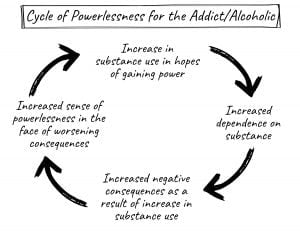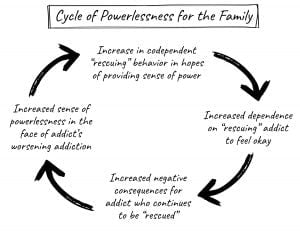By Matt Shedd
Everybody wants power. Everybody. And if they say they don’t, they’re lying.
-Robert Shenkkan
By the time our clients arrive at our door, they have run out of power.
Whereas previously they had been able to force their way through daily life, despite the worsening side effects of chronic addiction, they find that they are no longer able to do so. They now find themselves checking into a residential treatment facility, which is nobody’s first choice. In fact, they have likely tried everything possible to avoid it.
Most of our clients have been slowly losing the fight with their addiction for years, but it isn’t for lack of trying. In advanced addiction, people frequently swear to themselves and others that they will never drink or use again. And they mean it. Yet they continue to use and drink.
These are often smart, successful, capable people—people who seem to have easily been able to handle their problems up until now. Doctors, lawyers, nurses, successful business owners, pilots and other professionals regularly come to our centers as clients.
Yet, when it comes to addiction, these same people’s abilities are not enough. They desperately want power, but they can’t seem to access it.
The same is true for members of our family program struggling with codependency. Like the addict and alcoholic, the family members have exhausted themselves as well. They have tried making threats, taking back threats, lending money, letting their loved one move back home, practicing tough love, and everything in between.
They too have usually sworn to themselves multiple times that they are done participating in their loved one’s disease. Yet, they also find themselves jumping in to rescue their loved one from crisis after crisis, and it doesn’t seem to be getting better for their loved one or themselves.
In both cases, they desperately want to get better, perhaps more than anything, but they simply do not have the power to do so.
The Illusion of Power
We all want power, and in the early stages of addiction, substance use provides it.
When alcoholics or addicts begin to drink or use, they do not initially appear to be controlled by drugs and alcohol, either to themselves or to most outside observers. In fact, in the early stages the opposite seems to be true. Alcohol and drugs seem to be giving them a newfound sense of control over life.
If an alcoholic or addict tells you about this early stage of their addiction, while it’s happening, it feels as if they are having a profound spiritual experience. It is not a coincidence that liquor is referred to as “spirits.” In early addiction, perhaps for the first time in their life, the addict feels deeply connected to themselves, those around them, and even to something larger than themselves, such as “God” or “the Universe.”
But this phase of addiction with limited consequences is temporary. Rather than solely giving the addict or alcoholic a sense of power, the substance begins to betray the person, frequently putting them in positions where they feel powerless. The cost/benefit analysis of the addiction becomes more of a gamble, with the odds tilting increasingly in favor of the illness. Substance use still brings some relief, but also introduces other inconveniences like troubles at home, at work, or with the law.
Eventually, the illness crosses into a more desperate stage, where negative consequences far outweigh whatever positive benefits remain. The chemical dependency has made the substance necessary simply to maintain any sort of equilibrium, and the addict’s life circumstances become increasingly dire. Unemployment, divorce, and loss of family relationships are common in this phase. But the obsessive fantasy that the substance can provide them with power once again continues to dictate what seems like irrational behavior from the outside.
Herein lies the cruel irony of addiction. The substance that formerly provided the primary source of power for the addict or alcoholic has now become the primary mechanism of bondage. It’s a ruthless cycle, often imperceptible to those who are caught in it. The substance which formerly provided an escape from unwanted emotions eventually becomes the primary cause of the unwanted emotions. This leads to increased chemical dependence to deal with their chronic distress, and the cycle continues.
The same is true for family members of the addict who are caught up in an increasing cycle of codependent behavior. Rescuing, controlling, and enabling provide codependent family members with relief by giving the illusion of power over the addiction. But just like a drug, the codependent actions that formerly provided relief no longer suffice.
Deeper chemical addictions on the part of the addict demand deeper cooperation with the addiction from the codependent family members. Parents who regularly bail out their daughter financially when she overdraws on her account may eventually find themselves bailing her out of jail because of the progression of the addiction. Similarly, a wife who used to keep track of her alcoholic husband’s schedule might now need to call in sick on her husband’s behalf to create that same sense of control over an increasingly out of control home life.
This codependent “rescuing” behavior provides a perfect environment for the addict’s disease to continue to progress and cause more disruption in the home. And for the family, the codependent behaviors that used to provide an illusion of control in an uncontrollable situation no longer provide them with any relief. Deeper codependence is now required to create a sense of safety for the codependent family member. And on, and on it goes.
A Different Kind of Power
Those suffering from chemical addiction and their codependent family members are desperately in need of power. Both parties find themselves forcing their way through an increasingly painful life using tools that no longer work. Even if they know that there is no power left in their substance use or codependent behavior, where else are they to turn? The primary tools they have been using to handle their problems for years no longer work.
Often clients and their families find their way to us when they are at this point. Forcing their way through life with methods that no longer work has required them to coerce, cajole, manipulate, and impose their will on others and the world around them. This is an exhausting process, a constant grind. But recovery asks something different from us. As Dee K., a Men’s Center alumnus puts it, “life doesn’t have to be a grind.”
Everybody wants power. In fact, we all need it. Both chemical addiction and codependency—an addiction in its own right—narrow our vision of what is possible. Addiction deceives us into believing that there is only one place to find power. While caught in the addictive loop, we miss the fact that there are more effective sources of power available to us—an alternative to the coercive, domineering sense of power required by addiction.
Through the process of recovery, our clients and their family members can begin to conceive and access a different kind of power. Working the 12 Steps provides an opportunity for the person in recovery to see how ineffective and self-defeating their coping mechanisms have been. They begin to see things as they actually are. They can start to perceive that the survival skills they have been using are actually destroying their lives and negatively affecting everyone around them.
When these realities begin to take root, rather than continuing to rely on the isolating, coercive, and dominating power that was required to feed their addiction, people in recovery begin to find a more sustainable and enduring form of power. The 12 Steps point the way to a more authentic and reliable form of power that comes through the process of surrendering to how things are, rather than the way we think things should be. This power draws on the strength of community and mutual aid to deal with life as it comes. It is a power that can “match calamity with serenity” as the Big Book states.
When we experience the dependability of this deeper, more authentic power, we can start to perceive the unreliable nature of coercive power associated with addiction and codependency. Coercive power relies on dominating our circumstances and those around us to feed our addiction’s increasing demands. It’s unreliable because nobody can control people and circumstances outside of themselves at all times.
The authentic power that comes through recovery is quieter, but it works in all circumstances. It is available to us regardless of what is going on outside. It’s a power that we gain access to when we remove the false ideas and judgments that have been preventing access to our true selves, meaningful relationships with others, and something greater than ourselves. When we get rid of all of our resentments, judgments, fears, and shame, this authentic power seems to come in from all sides to help us deal with life’s problems as they arise.
This authentic power can get us through even the most trying circumstances. It can give us the courage to face life no matter what happens. At MARR we regularly see this power help our clients, alumni, and their families live meaningful and fulfilling lives in the face of all manner of difficulties, even job loss, imprisonment for past wrongs, or the tragic death of a loved one.
Only once we see these transformations take place, can we start to begin to understand what the Big Book means when it says: “Lack of power, that was our dilemma. We had to find a power by which we could live, and it had to be a Power greater than ourselves.”
Drinking, drug use, and codependent behavior are just the surface issues. They are what bring our clients and their family members to our door, but they are not the real problem. The real problem is that we all need power—authentic, reliable power. Working the 12 Steps is one way that we can start to find it.



